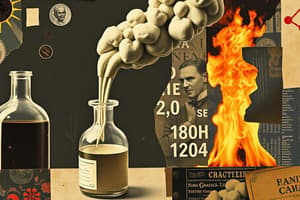Podcast
Questions and Answers
List the six types of chemical reactions.
List the six types of chemical reactions.
Combustion, Synthesis, Decomposition, Single Displacement, Double Displacement, Acid-Base.
Describe a combustion reaction.
Describe a combustion reaction.
A combustion reaction occurs when oxygen combines with another compound to form water and carbon dioxide. These reactions are exothermic, meaning they produce heat.
Describe a synthesis reaction.
Describe a synthesis reaction.
A synthesis reaction occurs when two or more simple compounds combine to form a more complicated one.
What is the general form of a synthesis reaction?
What is the general form of a synthesis reaction?
Describe a decomposition reaction.
Describe a decomposition reaction.
What is the general form of a decomposition reaction?
What is the general form of a decomposition reaction?
Describe a single displacement reaction.
Describe a single displacement reaction.
What is the general form of a single displacement reaction?
What is the general form of a single displacement reaction?
Describe a double displacement reaction.
Describe a double displacement reaction.
What is the general form of a double displacement reaction?
What is the general form of a double displacement reaction?
Describe an acid-base reaction.
Describe an acid-base reaction.
What is the general form of an acid-base reaction?
What is the general form of an acid-base reaction?
What kind of reaction is this? 2H2O --> 2H2 + O2
What kind of reaction is this? 2H2O --> 2H2 + O2
What kind of reaction is this? C10H8 + 12O2 --> 10CO2 + 4H2O
What kind of reaction is this? C10H8 + 12O2 --> 10CO2 + 4H2O
What kind of reaction is this? Mg + 2H2O --> Mg(OH)2 + H2
What kind of reaction is this? Mg + 2H2O --> Mg(OH)2 + H2
What kind of reaction is this? HBr + NaOH --> NaBr + H2O
What kind of reaction is this? HBr + NaOH --> NaBr + H2O
What kind of reaction is this? 8Fe + S8 --> 8FeS
What kind of reaction is this? 8Fe + S8 --> 8FeS
What kind of reaction is this? Pb(NO3)2 + 2KI --> PbI2 + 2KNO3
What kind of reaction is this? Pb(NO3)2 + 2KI --> PbI2 + 2KNO3
Decomposition of a carbonate yields what?
Decomposition of a carbonate yields what?
Decomposition of a chlorate yields what?
Decomposition of a chlorate yields what?
What is the reactivity series of elements?
What is the reactivity series of elements?
From most reactive to least reactive, list the halogen reactivity series.
From most reactive to least reactive, list the halogen reactivity series.
Keeping the Halogen Reactivity Series in mind, what kind of reaction is this, and what would it yield? Br2 + 2NaCl --> ___ + ___
Keeping the Halogen Reactivity Series in mind, what kind of reaction is this, and what would it yield? Br2 + 2NaCl --> ___ + ___
Flashcards are hidden until you start studying
Study Notes
Types of Chemical Reactions
- Six main types of chemical reactions: Combustion, Synthesis, Decomposition, Single Displacement, Double Displacement, and Acid-Base.
Combustion Reactions
- Occur when oxygen reacts with another compound.
- Produce water and carbon dioxide.
- Exothermic reactions that release heat.
Synthesis Reactions
- Involve two or more simple compounds combining to form a complex one.
- General form: A + B --> AB.
Decomposition Reactions
- Complex molecules break down into simpler ones.
- General form: AB --> A + B.
Single Displacement Reactions
- One element replaces another in a compound.
- General form: A + BC --> AC + B.
Double Displacement Reactions
- Cations and anions in two compounds exchange places, forming new compounds.
- General form: AB + CD --> AD + CB.
Acid-Base Reactions
- A specific type of double displacement reaction.
- Involves the reaction of an acid and a base, producing water and an ionic salt.
- General form: HA + BOH --> H2O + BA.
Specific Reaction Examples
- 2H2O --> 2H2 + O2 is a decomposition reaction.
- C10H8 + 12O2 --> 10CO2 + 4H2O is a combustion reaction.
- Mg + 2H2O --> Mg(OH)2 + H2 represents a single displacement reaction.
- HBr + NaOH --> NaBr + H2O exemplifies an acid-base reaction.
- 8Fe + S8 --> 8FeS is a synthesis reaction.
- Pb(NO3)2 + 2KI --> PbI2 + 2KNO3 indicates a double displacement reaction.
Decomposition Products
- Carbonate decomposition yields a metal oxide and carbon dioxide (e.g., CaCO3 --(heat)--> CaO + CO2).
- Chlorate decomposition yields a metal chloride and oxygen gas (e.g., 2KClO3 --(heat)--> 2KCl + 3O2).
Reactivity Series
- A ranking of elements based on their reactivity.
- Halogen reactivity series from most to least reactive: Fluorine, Chlorine, Bromine, Iodine.
Halogen Single Replacement Reaction
- Br2 + 2NaCl --> Cl2 + 2NaBr illustrates a single replacement reaction, where bromine replaces chlorine.
Studying That Suits You
Use AI to generate personalized quizzes and flashcards to suit your learning preferences.




